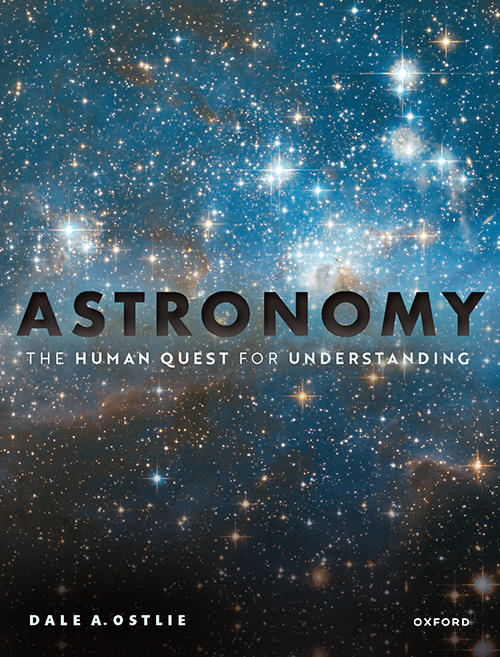Schedule
| schedule | room | instructor | |
|---|---|---|---|
| class | T,Th 12:30–1:45 | SC1224 | Prof. Ready |
| lab | W 5:30–8:15 | SC1141 | Dr. Scott |
Student Hours
M, W: 12—1:15 pm
T: 11—12:15 pm
Th: 11—12:15 pm; 4—5:30 pm
Science Complex, Room 3150M
Can’t make it during those times? No problem! Get in touch with me to arrange a time to meet. Worst case, we can do a Zoom call.
About ASTR 261
Students will develop an understanding of the physical processes governing motions of celestial objects; the electromagnetic spectrum and the interaction of light and matter; star and planet formation and evolution; the extragalactic distance scale; and the early universe.
In other words, a little bit of everything but we get to geek out a little more on some details.
Text & Polling
Students will receive an e-mail invitation to set up account.
You must use your @students.towson.edu e-mail to get credit for participation.
Grading & Credit
Your final grade will use the TU +/- grading system and will be based on the following:
| Component | % Total | Notes |
|---|---|---|
| Classroom Participation | 20% | your total clicker response score as a fraction of the total clicker points possible (which in turn depends on how many poll questions were asked over the course of the semester) |
| Weekly Quizzes, Online | 20% | lowest score dropped, the rest are averaged |
| Lab | 30% | lowest score dropped, the rest are averaged |
| Midterm | 15% | cumulative |
| Final | 15% | non-cumulative |
| Total | 100% | |
Your final letter grade for the class will be based on the rounded value of your final Grade Score and assigned according to the following scale:
| A | 93—100 | C+ | 77—79 |
|---|---|---|---|
| A– | 90—92 | C | 70—76 |
| B+ | 87—89 | D+ | 67—69 |
| B | 83—86 | D | 60—66 |
| B- | 80—82 | F | 00—59 (but seriously, you really gotta want that F) |
Exams
We’ll have two Exams, each worth 15% of your final score. One (1) excused exam absence can be made up. Unexcused exams will receive a zero (0) score. Except in unusual circumstances, two missed examinations will result in failure of the course.
Weekly Assignments
Each week, I’ll assign one or more assignments on Blackboard (typically in the form of quizzes). They may be attempted multiple times, and the highest scoring attempt submitted by the deadline is the one that gets recorded.
Late quiz submissions will not be accepted unless arrangements have been made prior to the due date/time of that particular assignment.
Throughout the semester your lowest quiz score is dropped, and 20% of the average of the remaining scores are added to your final score.
Classroom Participation
We will be using Poll Everywhere to record your responses to clicker questions. Each class (and some labs) will feature interactive questions. You’ll have some time to chat with your neighbor to determine the correct response. Points are awarded as follows:
- Correct: 3
- Incorrect: 2
- No response: 0
Responses are imported into Blackboard, and your final score is simply your total number of points as a percentage of the total points possible throughout the semester.
Although class attendance is not mandatory, if you miss a class, you will miss out on the points that were “up for grabs” that class session. Missed participation points will not be exempted unless arrangements have been made prior to the date of that particular class.
Lab
Although mainly designed to compliment what was covered in class, some labs may be used to introduce new topics. Lab experiments will be posted to Blackboard ahead of each session. All lab work is to be completed and turned in at the end of each lab session. Your lab instructor will give you further guidance on how labs are to be executed.
Your final lab grade will be the average of all but your lowest-scoring lab and will account for 30% of your final grade.
Tentative Schedule
Every class is different so there’s no way I can guarantee we’ll hit every one of these topics on every one of these dates. But to give you some idea of what to look for and when, here’s a possible schedule we might follow. Note that I reserve the right to alter the schedule and content as needed:
| Week | Topics | Text Sections | Lab | Notes |
|---|---|---|---|---|
| 8/25 | Introduction The Celestial Sphere |
2.1 Observing the Changing Sky with the Naked Eye 3.5 The Celestial Sphere |
Intro to Skynet 1 + Planetarium | |
| 9/1 | The Celestial Sphere Seasons, Planetary Motion |
4.3 The Motions of the Stars in the Heliocentric Universe 4.4 The Changing Seasons |
Intro to Skynet 2 + Data Reduction | |
| 9/8 | Orbits and Gravity | 4.11 Kepler’s Three Laws in their Original Form 5.3 The Universal Law of Gravitation 5.4 Newton Completes Kepler’s Laws |
Celestial Sphere, Earth & Seasons | |
| 9/15 | Radiation and Spectra | 6.5 Light is an Electromagnetic Wave 6.6 Blackbody Radiation 6.7 The Inverse Square Law of Light 7.1 Prisms, Scattering, Diffraction, and Spectral Lines 8.1 Blackbody Radiation and Planck’s Energy Quanta 8.4 The Doppler Effect for Light |
Galilean Revolution | |
| 9/22 | Radiation and Spectra Telescopes |
15.1 Observing the Cosmos across Wavelengths | Blackbodies & Spectroscopy | |
| 9/29 | The Solar System Terrestrial Planets |
Telescopes | ||
| 10/6 | Giant Planets, Rings, Moons The Sun as a Star |
Greenhouse Effect | ||
| 10/13 | Midterm Stellar Properties |
Asteroids & Meteorites | ||
| 10/20 | Stellar Properties Interstellar Medium |
Distance Ladder I: Parallax | ||
| 10/27 | Star Formation Stellar Evolution |
Stellar Spectra & HR Diagrams | ||
| 11/3 | Stellar Evolution Black Holes |
Distance Ladder II: Cepheids & Supernovae | ||
| 11/10 | The Milky Way Galaxy Galaxies |
The Great Debate | ||
| 11/17 | Quasars and Active Galactic Nuclei | Galaxy Rotation Curves | NOTE: No labs or classes 11/22-26 for Thanksgiving Break | |
| 11/24 | Large Scale Structure of the Universe | n/a | Thanksgiving week; class on Tuesday but no lab or Thursday class | |
| 12/1 | Cosmology & the Big Bang | Hubble’s Law | Last week of class & lab | |
| 12/8 | Final Tuesday Dec 10 12:30 | Same room |
Conduct
be excellent to each other
I can’t believe I have to write this, but bullying, distracting comments, trolling, and acting like a jerk will not be tolerated. The penalty for inappropriate behavior will be determined by me and may include failure and/or removal from the class.
stay on target
Please come to class prepared to learn. As a courtesy to me and your fellow students, do not read extraneous materials, use the computers for non-class purposes, or fiddle with electronic gadgets while you are in class 1.
So turn off your phone—or at the very least, set it to vibrate—when you come to class. Thanks.
Academic Integrity
If you’re thinking about cheating, forget it. Cheating on examinations, labs, or any other aspect of the course will result in a penalty. The penalty for cheating will be determined by me and may include failure of the course and the reporting of the incident to the Vice President for Student Life.
Late/Missed Assignments
Assignments, including (but not limited to) labs, will be accepted late on a case-by-case basis if notice is given prior to the due date of the assignment.
Copyright
My lectures and course materials, including, but not limited to Keynote presentations, PDFs, tests, outlines, and similar materials, are protected by copyright. I am the exclusive owner of copyright in those materials I create. You may take notes and make copies of course materials for your own use; however, you may not, nor may you allow others to, reproduce or distribute lecture notes and course materials publicly whether or not a fee is charged without my express written consent.
And yes, that includes uploading stuff to sites like Chegg, CourseHero, etc.
Diversity
The Department of Physics, Astronomy and Geosciences (PAGS), in accordance with the Fisher College of Science and Mathematics (FCSM) and with the Towson University Strategic Plan, support initiatives that promote diversity among FCSM faculty, staff and students. We are committed to increasing the quality and diversity of our students, faculty and staff while increasing retention and curriculum initiatives. To obtain further information related to diversity initiatives, please visit:
footnotes
- Except when using clickers, in which case fiddle away. ↩

